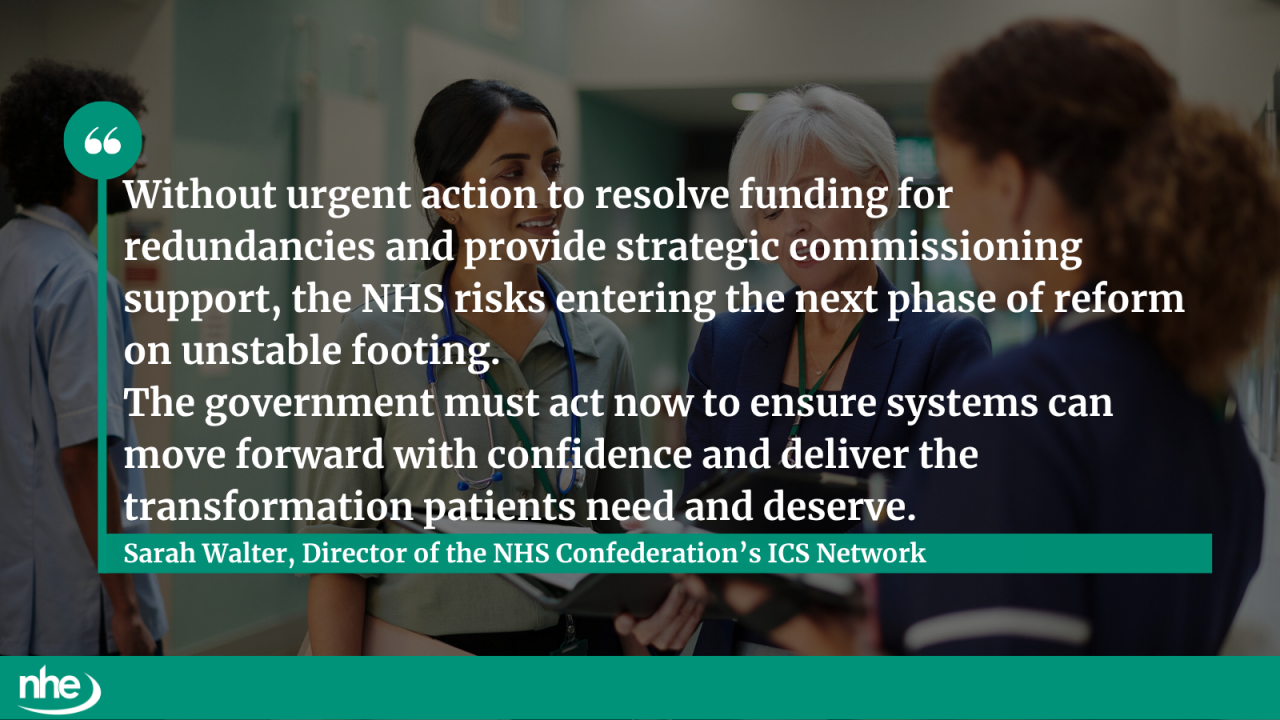A new report from the NHS Confederation has revealed strong support among Integrated Care System leaders for the government’s Ten-Year Health Plan, but warned that uncertainty over redundancy funding is threatening to derail progress.
The State of Integrated Care Systems 2025 report, based on a survey of senior Integrated Care Board and Integrated Care Partnership leaders, shows that while systems are already implementing key reforms, they are being held back by cost-cutting pressures and lack of clarity around restructuring.
More than half of ICS leaders report progress on the government’s three strategic shifts:
- Hospital to community care
- Analogue to digital transformation
- Sickness to prevention
However, the requirement for ICBs to cut running costs by 50% - estimated to require £1 billion in redundancies – has created a major barrier. 95% of ICB leaders expressed concern about the impact of these cuts on their ability to deliver national priorities.
One ICB chair noted that “all attention has been on the process of reorganisation itself,” rather than on delivering care transformation.
ICS leaders are urging the Department of Health and Social Care and NHS England to provide clear timelines and funding commitments for restructuring. Without this, systems remain in limbo—unable to plan effectively, reassure staff, or release savings.
The report also highlights a need for strategic commissioning support and skills development, as well as concerns over statutory responsibilities like safeguarding and medicines optimisation. Alongside this, the report outlines calls for a more devolved operating model and cross-government collaboration
The NHS Confederation has recommended:
- Clear communication and support for systems facing staffing or service cuts
- Appointment of a senior commissioning lead within DHSC
- Alignment of policy and legislation across government
- Empowering ICBs to make strategic decisions and co-develop commissioning tools
Director of the NHS Confederation’s ICS Network, Sarah Walter, commented:
“ICS leaders are fully committed to implementing the government’s Ten-Year Health Plan and making the key shifts it sets out. This report, in fact, shows that many are making significant progress despite the difficult financial and operational pressures they are under.
“But they need further clarity, support and the right tools to do so. Without urgent action to resolve funding for redundancies and provide strategic commissioning support, the NHS risks entering the next phase of reform on unstable footing.
“The government must act now to ensure systems can move forward with confidence and deliver the transformation patients need and deserve.”

With over 4,000 public appointees and growing demand for integrated care, the report warns that delays in funding decisions could undermine the very reforms designed to improve outcomes for local populations.
Cllr Wendy Taylor, Chair of the Local Government Association’s Health and Wellbeing Committee, responded to the report, saying:
“Councils remain committed to working collaboratively with health partners during this period of considerable change. As the report highlights, health and local government are two sides of the same coin, with actions and decisions made by each side impacting on the other.
“Effective integration across the NHS and local government is essential to deliver for communities. With major change in both sectors, we must commit to rewire together, not turn inward into silos.
“Local government has a central role in the success of the government’s 10-year health plan and councils are already working to co-develop Neighbourhood models which are shaped around the needs of local communities.
“The report rightly highlights the positive legacy of integrated health and care over the past few years in tackling health inequalities and improving outcomes. It is vital that this legacy is built upon as the new neighbourhood health model is delivered.”
Image credit: iStock



















